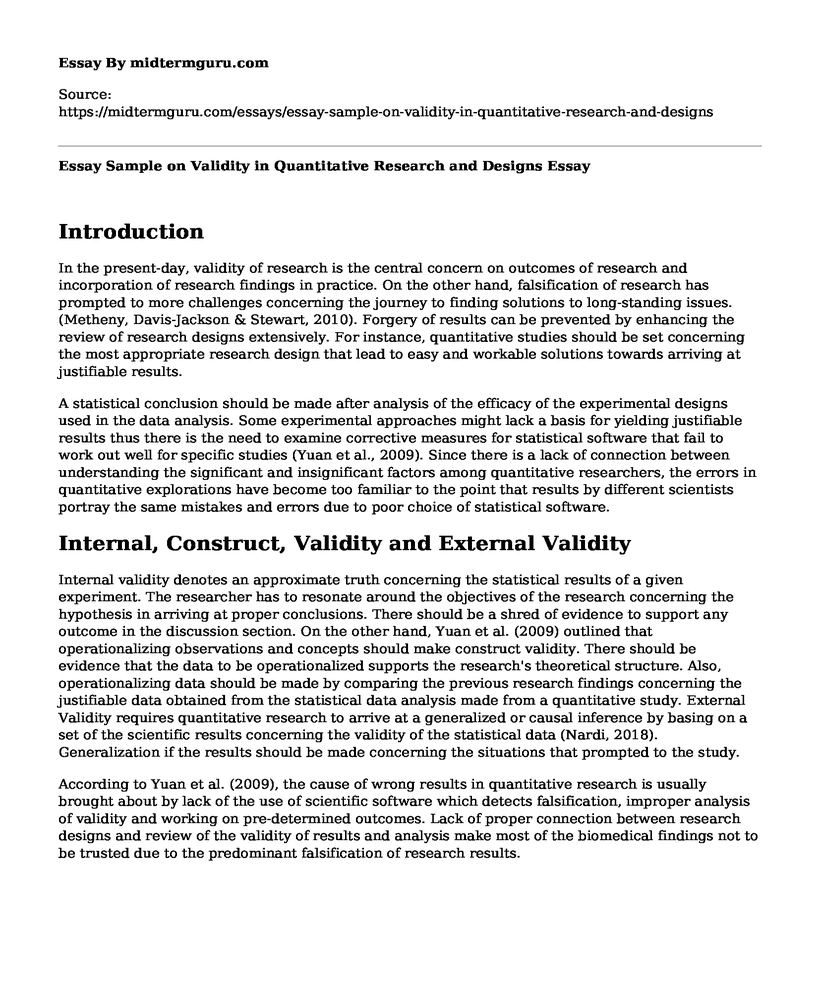Introduction
In the present-day, validity of research is the central concern on outcomes of research and incorporation of research findings in practice. On the other hand, falsification of research has prompted to more challenges concerning the journey to finding solutions to long-standing issues. (Metheny, Davis-Jackson & Stewart, 2010). Forgery of results can be prevented by enhancing the review of research designs extensively. For instance, quantitative studies should be set concerning the most appropriate research design that lead to easy and workable solutions towards arriving at justifiable results.
A statistical conclusion should be made after analysis of the efficacy of the experimental designs used in the data analysis. Some experimental approaches might lack a basis for yielding justifiable results thus there is the need to examine corrective measures for statistical software that fail to work out well for specific studies (Yuan et al., 2009). Since there is a lack of connection between understanding the significant and insignificant factors among quantitative researchers, the errors in quantitative explorations have become too familiar to the point that results by different scientists portray the same mistakes and errors due to poor choice of statistical software.
Internal, Construct, Validity and External Validity
Internal validity denotes an approximate truth concerning the statistical results of a given experiment. The researcher has to resonate around the objectives of the research concerning the hypothesis in arriving at proper conclusions. There should be a shred of evidence to support any outcome in the discussion section. On the other hand, Yuan et al. (2009) outlined that operationalizing observations and concepts should make construct validity. There should be evidence that the data to be operationalized supports the research's theoretical structure. Also, operationalizing data should be made by comparing the previous research findings concerning the justifiable data obtained from the statistical data analysis made from a quantitative study. External Validity requires quantitative research to arrive at a generalized or causal inference by basing on a set of the scientific results concerning the validity of the statistical data (Nardi, 2018). Generalization if the results should be made concerning the situations that prompted to the study.
According to Yuan et al. (2009), the cause of wrong results in quantitative research is usually brought about by lack of the use of scientific software which detects falsification, improper analysis of validity and working on pre-determined outcomes. Lack of proper connection between research designs and review of the validity of results and analysis make most of the biomedical findings not to be trusted due to the predominant falsification of research results.
References
Metheny, N. A., Davis-Jackson, J., & Stewart, B. J. (2010). Effectiveness of an aspiration risk-reduction protocol. Nursing Research, 59(1), 18-25.
Nardi, P. M. (2018). Doing survey research: A guide to quantitative methods. Routledge.
Yuan, S., Chou, M., Hwu, L., Chang, Y., Hsu, W., & Kuo, H. (2009). An intervention program to promote health-related physical fitness in nurses. Journal of Clinical Nursing, 18(10), 1,404-1,411.
Cite this page
Essay Sample on Validity in Quantitative Research and Designs. (2022, Aug 17). Retrieved from https://midtermguru.com/essays/essay-sample-on-validity-in-quantitative-research-and-designs
If you are the original author of this essay and no longer wish to have it published on the midtermguru.com website, please click below to request its removal:
- Levenes Test for Equality of Variances T-Test for Equality of Means
- Barriers to Communications in Research Work - Paper Sample
- Essay on Qualitative Research Methods and Quantitative Research Methods
- Statistical Process Capability - Essay Sample
- Methodological Approaches Used to Gather Data Analysis Essay
- Paper Example on Dependent and Independent Samples in Hypothesis Testing
- Qualitative Research: Gathering Factual Data With Research Design - Research Paper







